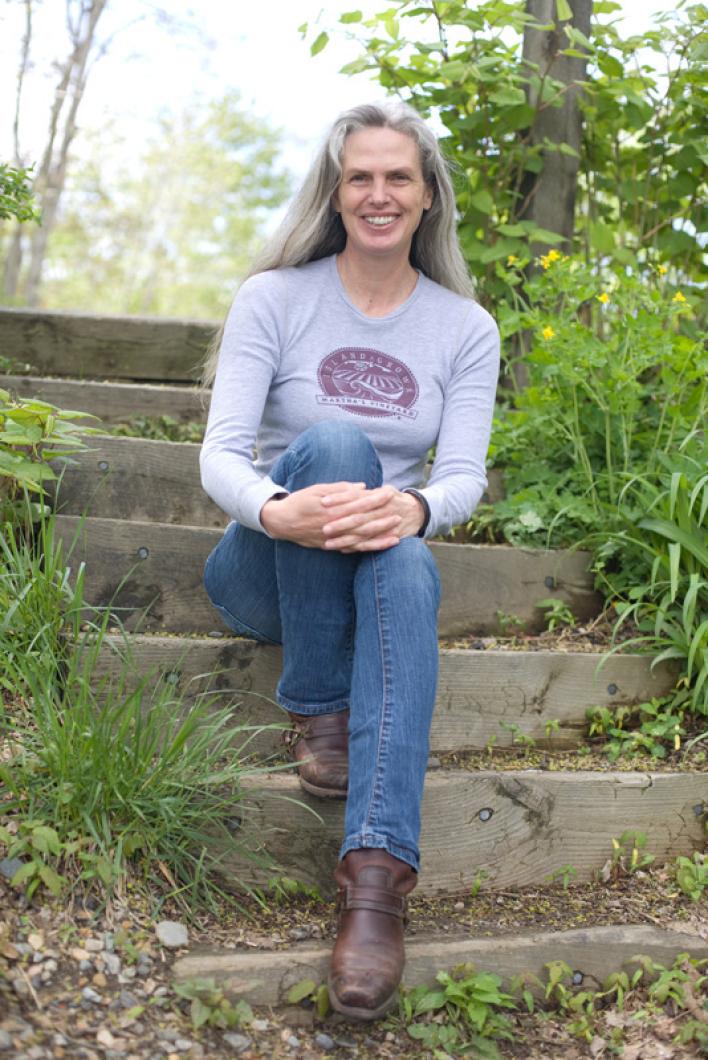Over the past 15 years, Alison Berlow’s trajectory from stay-at-home mom to radio essayist, to founder and executive director of the Island Grown Initiative and, most recently, the editor of Edible Vineyard, has been inextricably tied with the rising fortunes of the local food movement.
Now, at the helm of a great and growing organization and a promising new journal, she is still doing what she has done all along — thinking big and acting in small ways. The transition from an industrial food system to a local one, she believes, is going to demand a comprehensive rehaul of “infrastructure — in regulations, in legislation and in brick and mortar.”
In the meantime, “Every meal you have a chance to stay optimistic.” Breakfast this morning? An egg sandwich from the Scottish Bakehouse. Island eggs, all the veggies.
Tall, slim and calm, with that particular beauty possessed by people who appear, for some reason, to have earned their faces, Mrs. Berlow began her writing career in 2002 with a series of essays for the local National Public Radio station.
The Cook’s Notebook, originally aired from 2002 to 2008 and still played on member stations, is a collection of reflections on places and people near and far, in each of which a transformation or revelation is brought about through the agency of a certain kind of food.
The stories seem to be informed by the intuition that food is not just food, but rather a medium through which meaning or emotion passes between individuals.
In Homecoming Feasts, a story about a Korean student that the narrator’s son brings home for a spring break visit from boarding school, she writes, “What I thought I could offer him and I tried, were the comforts of flavor: soy, ginger, roasted sesame, garlic, slight sugar, a tang of vinegar, minces of spring onions.” The feeling of maternal love pulsing through the prose could probably not have been so potently delivered had the words described actual emotions rather than food.
For Mrs. Berlow, the connection between food and the greater human drama is so fundamental that mere recipes have a narrative content in her eyes. “Cookbooks are like short stories with happy endings,” she says. “I like that.”
When you think of food this way, you are bound, as Mrs. Berlow eventually was, to confront some of the grosser imbecilities inherent in our current way of producing it. To begin to wonder, for example, about the life of the chicken behind the boneless, skinless mass of flesh lying on styrofoam in the grocery store.
This kind of unnerving reflection had been harassing Mrs. Berlow for some time when, at a writers conference in May 2005, she began a conversation with friend and cookbook author John Ash, about “sustainability, and what that concept really means.”
Recognizing that they had opened up a topic too large to be dispatched within the allotted time, Ash decided to skip the James Beard Awards, where his cookbook was up for a prize, and come to the Vineyard for a potluck dinner at Mrs. Berlow’s house instead.
Mrs. Berlow then “threw darts at the local food web,” inviting farmers, grocers and cookbook authors to the dinner, along with members of the Island Committee on Hunger (she is a longtime volunteer at the Island food pantry). The food, she recalls, was delicious; the outcome, momentous.
From that single potluck there ultimately emerged not one but two nonprofit organizations dedicated to the cause of local food — the Island Grown Initiative, or IGI, and a Martha’s Vineyard chapter of the international Slow Food movement. Even for Mrs. Berlow, who is accustomed to viewing dinners as moments of transformation, this may have been an unexpected coup.
The first project taken on by what was to become IGI was the creation of a map of Island farms, aimed at connecting consumers with the local produce that surrounds us, but sometimes seems elusive. Mrs. Berlow had experienced the frustration of driving around on the Island, seeing, “sheep in the field and wondering, how do I get that leg of lamb on my dinner table?”
The same straightforward and practical goal animates Edible Vineyard, the new venture that has Mrs. Berlow teamed up with her husband, Sam Berlow, who serves as the magazine’s publisher. The Edible office adjoins that of the Font Bureau, the digital type foundry where Mr. Berlow is general manager.
As a writer whose work was first published over the airwaves, Mrs. Berlow is attracted to the immateriality of radio (“It floats across the water and disappears”) and had to think seriously about the decision to use actual paper. “You have to think about what is worth printing.”
Edible Vineyard, judging by the first issue, is worth it. Its clean, fresh, organic aesthetic injects a refreshing draught of urbanity onto our local newsstands. Its tone is intellectually expansive without skimping on the utilitarian. Descriptions of local and regional food systems live comfortably beside how-tos, where-to-finds, and recipes. “I come at this from a cook’s perspective,” she says.
So, what is Mrs. Berlow having for dinner tonight? “Roast chicken. I’ll get it from Cronig’s. Rumor may have it that I’ve got a stockpile of locally raised chicken somewhere . . .” she jokes. “For now, if I can get one or two local things in there, that’s good.”







Comments
Comment policy »